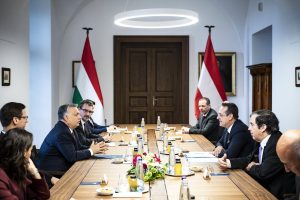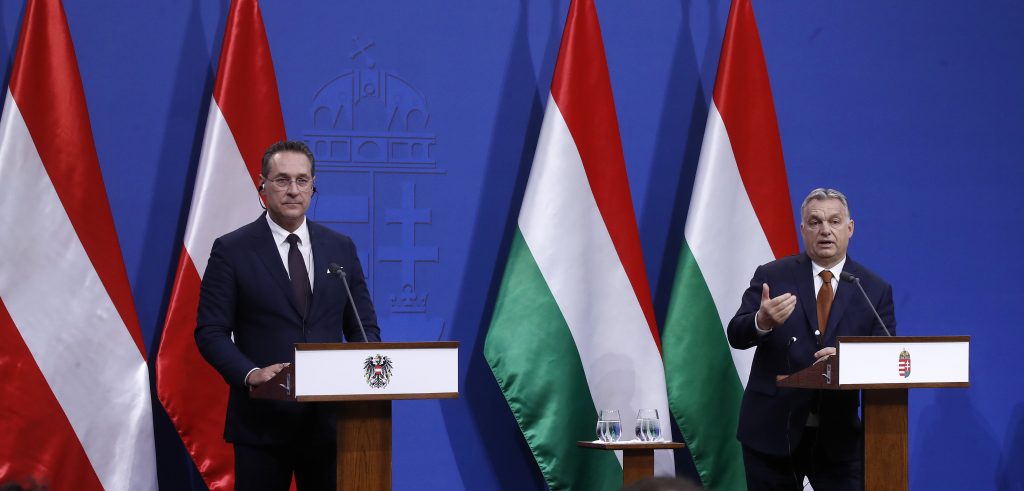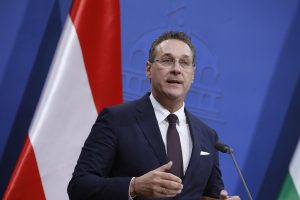Change language:
Vice-Chancellor Strache hold talks with PM Orbán in Budapest

By protecting its southern border, Hungary also protects Austria’s border, Prime Minister Viktor Orbán said on Monday after talks with Vice-Chancellor of Austria Heinz-Christian Strache, who is also chairman of the Freedom Party (FPÖ).
It took Strache and his Freedom Party for Austria to adopt an anti-migration stance and demonstrate sympathy for Hungary’s border protection efforts, Orbán told a joint press conference after the meeting. The previous, left-wing government in Austria did everything in its power to prevent Hungary from building its border fence but everything changed with the right-wing government, he said.
Changes are needed in Europe similar to those in Austria, Orbán added. If Austria’s centre-right ruling party can work together with a patriotic rightist party then this should be possible elsewhere in Europe, he said, adding that what works in Vienna could also work in Brussels.
Orbán described the European left-wing as “hopelessly pro-migration” and said if the centre-right parties were to work together with the left wing then sooner or later they would be forced to make a compromise.
“Instead of a European grand coalition we intend to keep on the agenda the possibility of opening to the right,” he said.

There was general agreement at the meeting that Christian culture must be given priority, because respect for women, the freedom of speech and religion, and the equality of voting rights can only be maintained in a Christian cultural environment, Orbán said.
He also said they were in agreement that Hungarian-Austrian bilateral relations were orderly and successful. He added that he expected further cooperation between Hungary and Austria, describing them as two countries with successful economies.
The European left has an economic programme involving tax increases, bureaucracy and growing debt, which is essentially “a socialist system” that Hungary has already experienced and “would not like to see Brussels experiment with”, Orbán said.
Asked to comment on ruling Fidesz’s decision to withdraw support for Manfred Weber’s candidacy, he said “Hungary’s government and its head” cannot be in the position to support a European commission presidential candidate who has announced that he does not want the vote of Hungarians.
Weber has said he does not want to become commission president with the help of votes from Hungary, Orbán added.
“This is a serious position and a violation of the principle to always respect voters,” Orbán said.
The government does not consider any of the candidates in the EC presidential campaign to be suitable and “we are looking for a suitable candidate”, he said, adding that a complicated series of talks could be expected ahead of the president’s election.
Orbán said that though the “pro-migration forces” — which he said included the left and the majority of the EPP — were in a strong position, the rise of the “anti-migration” forces — the right wing of the EPP and parties to its right — would create “a more balanced situation”.
The prime minister expressed hope that the European Council would eventually have more members who belong to the right wing of the EPP or the parties to its right.
As regards Fidesz’s EPP membership, he said
the party did not see a place for itself in an EPP whose majority comprised “pro-migration forces”.
“This was why we had to suspend our membership rights, to wait and see in which direction the party turns after the election,” Orbán said. He added, however, that the view that the EPP should open to the right, backed by Fidesz, was a minority one within the grouping.
Orbán said that if Fidesz had a right to hold the minority view within the EPP regarding strategic matters, it would stay in the grouping. But, he said, if the EPP “becomes intolerant, then we will of course have to find our place elsewhere”.

The prime minister stressed, however, that Fidesz would hold off on making a decision about its EPP membership until after the EP election. This was why, he said, the party had not attended a political meeting recently convened by Italian deputy PM Matteo Salvini, insisting that Fidesz did not want to quit the EPP without knowing the outcome of the elections.
On the subject of the renegotiation of the EU’s Lisbon Treaty, Orbán said he would welcome “opening up the question of the treaty if we were able”, adding that “we’re forced into the treaty currently in effect”.
Asked about Hungarian-Austrian cooperation, he said that
although the two countries had some opposing interests, they could be managed “with good will and strength of spirit”.
Orban said he was certain that Hungary and Austria could find solutions to all their disagreements.
He said that on the issue of Austria’s decision to cut family benefits for foreigners working in the country, they had decided not to address the matter until the European Court of Justice has reached its verdict.
Orban also said Fidesz was keeping track of which parties and politicians stood up for Hungary “whenever the European left launches an attack against Hungary”. The prime minister said
the FPÖ had clearly stood up for his country, adding that “we won’t forget this.”
Strache: Federal Europe is needed
A federal rather than a centralised Europe is needed, Heinz-Christian Strache, Austria’s vice-chancellor, said at a press conference.
Europe should keep its Christian values to the fore and should be capable of defending itself, he said.

Strache said Europe was in need of greater togetherness and greater acceptance. Individual parties within European party families should be treated as equals and with respect, he added.
Europe, he said, was “seriously divided due to borders being flung open and the import of terrorists, which has led to a sense of impotence and fear among the population”.
Strache slammed the “irresponsible Willkommenskultur” in western Europe and the “stealthy Islamisation and displacement of the population.”
He said “patriotic” parties were likely to do well in the European parliamentary elections and it was possible that a patriotic European group may be formed for the first time and even form a majority. The European People’s Party should therefore think again about its policy of excluding patriotic parties, he said.
Strache said Austria-Hungary ties had always been special and linked by close economic relations and a common history. Cooperation in the area of infrastructure and border protection is intensive, he said, adding that Hungary and Austria jointly fight cross-border crime, illegal migration and human trafficking.
He thanked Orbán for protecting the bloc’s external borders “responsibly” during the migration crisis. This has helped to stop illegal migration and changed how people think about migration in Europe, the Austrian vice-chancellor added.
Asked about his party’s tendencies, Strache said the Freedom Party was not extremist, but a center-right-rightist formation which rejected everything related to fascism, national socialism and anti-Semitism.
Source: MTI







